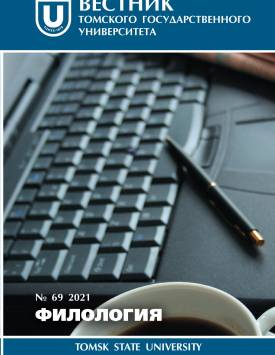The Communicative-Pragmatic Aspect of the Use of Paradoxes in Oscar Wilde’s Comedy An Ideal Husband
The article investigates the communicative-pragmatic aspect of the use of paradoxes in Oscar Wilde’s comedy An Ideal Husband. Here, paradox is viewed as an utterance syntactically represented by a phrase, one or several sentences which deny commonly accepted opinions and stereotypes. It is alogical, contradictory and interprets well-known and familiar things in an unusual way. The research has demonstrated that, in the play, paradoxical utterances are used, predominantly, in speech acts of two characters - Lord Goring and Mrs. Cheveley. As a rule, they use paradoxes in situations of speech conflict and, less frequently, in situations of non-conflict speech interaction. In a one-way speech conflict situation paradoxes help Lord Goring resist the oppression of his farther Lord Caversham, who employs a confrontation strategy in conversations with his son. The paradoxes distort the meaning or reduce the axiological and pragmatic significance of Lord Caversham’s utterances, which, as a rule, are critical or evaluating remarks, directive questions and categorical statements distinguished by subjectivity and bias. Some of Lord Goring’s paradoxes make the judgments, opinions and propositions of his father appear comic, thus, their correctness, seriousness or acceptability are denied. A mutual speech conflict is realized in interaction between Lord Goring and Mrs. Cheveley. Both the interlocutors are involved in confrontation and use the speech strategy of dominance in order to take the leading role in dialogue. The implementation of the dominance strategy is accomplished through a skillful use of paradoxical utterances. By means of paradoxes, the characters justify their own opinions and actions, deny the sincerity, acceptability and expediency of the interlocutor’s views and propositions, give (negative) assessment of their opponents’ personality and behavior. Paradoxical utterances are also employed in speech situations of non-confrontational nature within the framework of the dominance strategy (Mrs. Cheveley and Sir Robert Chiltem) and, to a lesser degree, the cooperation strategy (Lord Goring and Sir Robert Chiltern). In the first case, paradoxes function as hints manifesting the speaker’s communicative intention to show her superiority based on the possession of some special knowledge in order to impact the emotions and actions of the interlocutor. In the second case, paradoxes are aimed at defusing a tense situation and forming an empathetic connection between the speakers. Quite often, the semantic content of paradoxes is determined by the communicative situation of their usage and the speaker’s personality. Paradoxes are created in a certain communicative context and lose their relevance when taken out of this context. They also express a character’s subjective opinion which is often formed under the influence of strong (negative) emotions, or reflect a character’s worldview and philosophy of life.
Keywords
paradox, Oscar Wilde, communicative intention, humorous effect, resistance to oppression, speech conflict, speech strategy, dominance strategyAuthors
| Name | Organization | |
| Golubeva Tatiana. M. | Nizhny Novgorod State Technical University named after R.E. Alekseev | gtm77@mail.ru |
References

The Communicative-Pragmatic Aspect of the Use of Paradoxes in Oscar Wilde’s Comedy An Ideal Husband | Vestnik Tomskogo gosudarstvennogo universiteta. Filologiya – Tomsk State University Journal of Philology. 2021. № 69. DOI: 10.17223/19986645/69/3
